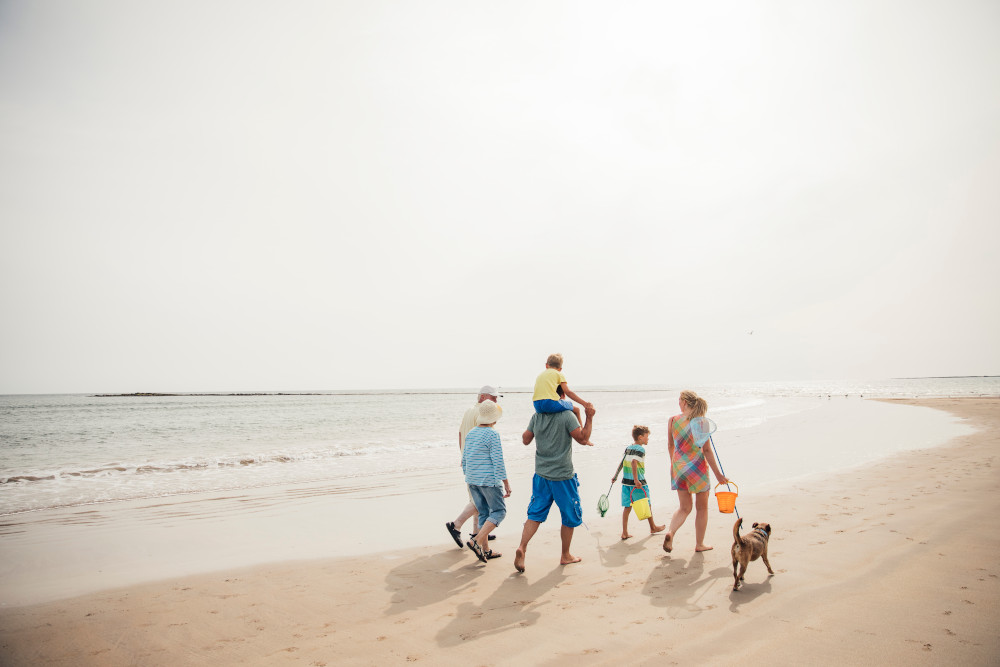
Take some time to prepare for your road trip with your dog so that your holiday is as safe and relaxed as possible for both of you. Following are some basic points to keep in mind when taking your dog on holiday with you:
- It is important that your dog is used to travelling by car to help make the experience comfortable and safe for them and you. For dogs unfamiliar or uncomfortable with car travel, this process needs to start well ahead of the journey. Reward-based training should be used to gradually familiarise the dog to car travel in a positive way at their own pace. So when planning a road trip, factor this preparation period into your plans if your dog is unfamiliar or uncomfortable with car travel.
- Make sure your dog is microchipped and that your contact details are up to date and recorded on the microchip register. There are currently 5 private microchip registries and 2 state government registries (SA and NSW). Make sure the one your dog is recorded on is recognised nationally (and not just in your state). If your register is only state-based, it’s also a good idea to also register on a national register to help ensure that you can be contacted if your dog is lost at any point (including interstate). You can find more information on the microchip registries and how to update your contact details here. Also attach an ID tag with your contact details on it to your dog’s collar. If your dog has to be registered in your state or territory, also make sure their registration is up to date.
- Check the laws that apply to transporting dogs by road in the relevant states. Check the state Road Traffic Authority (or equivalent) Road Rules.
- Make sure that your dog is healthy enough to travel and that all of their vaccinations, worming and flea treatment are up to date before setting off. If your pet takes any prescription medication make sure that you have enough to see you through the holiday and take a prescription for the medication with you too, just in case. Talk to your veterinarian for advice, including specific preventative care advice for the location you are going to (for example, dogs need paralysis tick and/or heartworm prevention in some areas).
- Before you leave, you will need to ensure your dog will be comfortable and safe during the trip.
- It is important to securely restrain your dog in the car for their safety and yours. Please see this article for more information and the RSPCA’s policy on transportation of companion animals and our transportation general principles policy.
- Never leave your dog unattended in a car. Dogs can very quickly suffer from potentially fatal heat stress, even in mild weather. Keep the car’s interior at a comfortable temperature and make sure there is adequate air flow.
- To help your dog cope with being in the car, it can be useful to make sure they’ve had the opportunity for some exercise and play before they get in the car. Also, avoid feeding your dog for a couple of hours prior to a car trip so they don’t have a full stomach that may contribute to them feeling uncomfortable or sick in the car.
- If your dog suffers from car sickness, please talk to your veterinarian well before your planned trip to put in place an appropriate plan to help them.
- Remember to stop for plenty of toilet breaks during your road trip to keep your dog comfortable and avoid toileting accidents in the car. Make time for on-leash exercise outside of the vehicle too, in a safe and secure area. Keep your dog on a leash when in an unfamiliar environment so that they are secure if they take fright at any unfamiliar sights or sounds.
- If possible, have the contact details of the local vet at your end destination and vet clinics along the way (if it’s a long trip) at hand in case you need to make an appointment or there is an emergency.
Checklist
Things you should pack for your dog are:
- Your pet’s regular food and treats (enough for the whole time away in case you cannot buy their normal food where you are travelling). Don’t forget a can opener if your dog eats tinned food.
- Comfortable bedding and/or a travel crate for them to sleep in.
- Food and water bowls. Always carry enough bottles of fresh water for the journey in case you can’t find safe water along the way.
- Collar/harness and leash.
- Your dog’s favourite toy(s).
- Grooming equipment including a towel in case your dog gets wet.
- A ‘pooper scooper’ and poo bags to clean up after your dog.
- Any required medications (and a prescription for any prescription medications) and a first aid kit.
To find pet-friendly accommodation, it’s easiest to start by doing some online research for pet friendly places.

